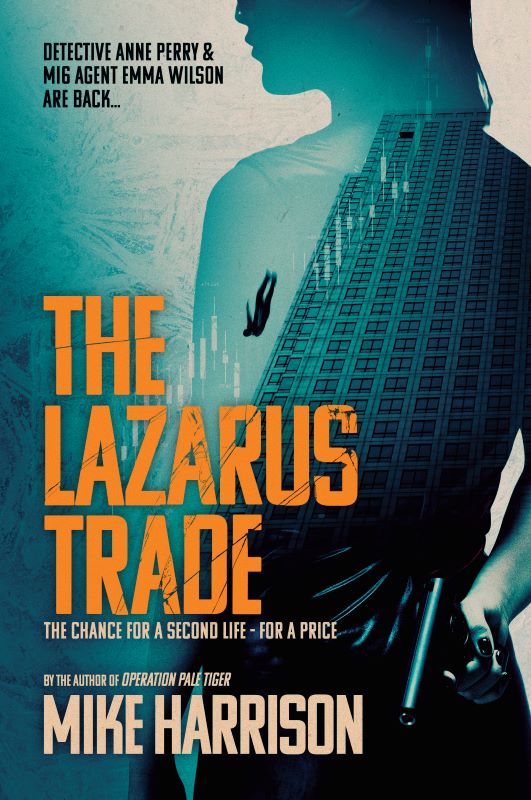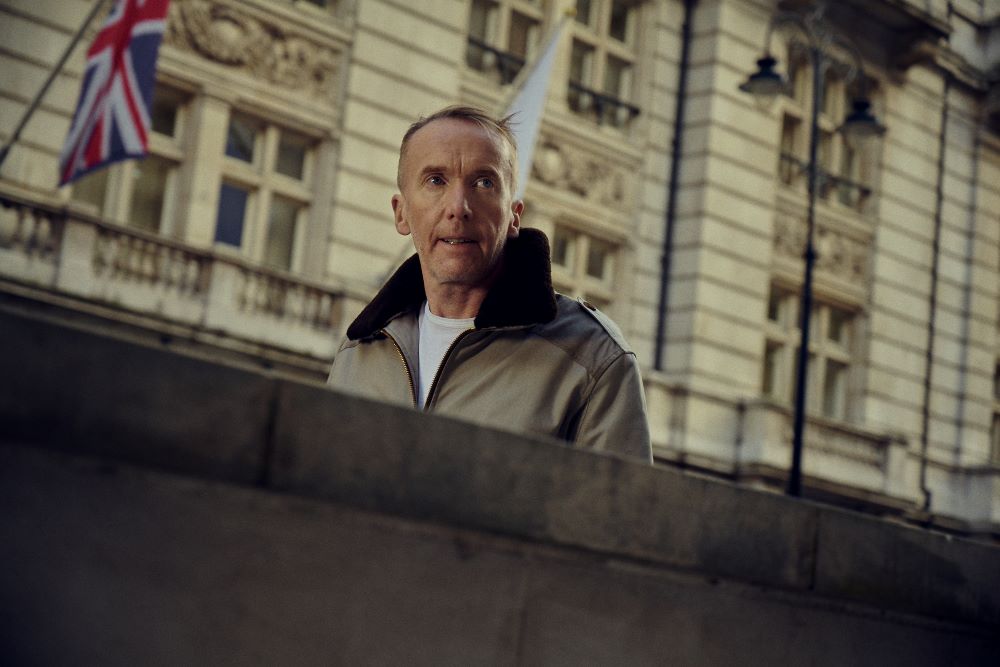Synopsis
The Lazarus Trade
DAWN CRYO, THE WORLD’S FIRST CRYOGENICS COMPANY IS ABOUT TO BE FLOATED ON THE EXCHANGES. FINALLY, THOSE WHO THOUGHT THEY FACED CERTAIN DEATH CAN BE FROZEN UNTIL A CURE IS FOUND – FOR A PRICE.
When two bankers close to the Dawn Cryo deal are found dead, DI Anne Perry is sent to investigate. Apparent suicides – all Anne Perry’s instincts tell her they were murdered.
Apparently unconnected, MI6 agent Emma Wilson is sent to Buenos Aires. Someone is putting together a crack mercenary crew, target unknown. Her job: to infiltrate the team, led by a notorious psychopath known as ‘The Viking’.
At the bank running the Dawn Cryo deal, Beverly Kane is sent to Boston. She must persuade the huge east coast hedge funds to back the deal. Behind the well-appointed veneer of the city, she senses sinister forces in play.
As Emma Wilson moves north with the team, under the murderous gaze of ‘The Viking’, Anne Perry finds herself drawn into a hedge fund world of limitless greed. A world where there are no rules and death is just another trade.
DAWN CRYO… what is it about this deal that kills those that get too close?
We caught up with Mike Harrison just ahead of the launch of his new thriller THE LAZARUS TRADE.
So, DI Anne Perry and MI6 Agent Emma Wilson are back. What can we expect in THE LAZARUS TRADE?
‘Cryogenics, is the world ready? Well, ready or not, in my new story it’s arrived, and the launch of the world’s first cryogenics company onto the markets stirs powerful vested interests into deadly action. Like all new technologies, for every winner, there’s a loser and we soon see that these rival forces are more than willing to kill to destroy the deal – or to save it.
DI Anne Perry investigating mysterious deaths in London and Emma Wilson sent to eliminate a known assassin in Buenos Aires will both be drawn into the same fierce cauldron of money, power politics and corruption. With the stakes this high, no one is safe – and no one is innocent.
The action also takes us to two more of my favourite cities. Buenos Aires may be a little shabbier and a little edgier with every visit, but the people still strut a chic swagger and the night time streets of Palermo pulse with defiant energy. Boston calls itself The Friendly City, and why not? But beneath the solid bonhomie there are hints of the city’s darker past. Drive a little to the north along the coast and the chill spires of Salem still stand framed against the timeless sky…
‘OK, let me just catch my breath for a moment. This cryogenics deal sounds like the lynchpin of the story. What is it about the science that drew you to it?’
‘All big technology breakthroughs bring changes in human behaviour. Cryogenics, if it can ever be made to work, will challenge some of our most fundamental assumptions about mortality. Can you imagine? You’re terminally ill, but the technology’s there to freeze you, put you in a state of deep hibernation. Just barely alive, but alive. They can keep you in this state for years. If this is your only chance, and you can afford it, well, why not?
A big, society changing deal is also a great way to explore the way money, power dynamics and politics feed off each other at the heart of financial markets. Outsiders might think that financial markets are structured, ordered places, hemmed in by rules and regulations. That is exactly what the markets want you to believe. You only have to look at the behaviour of the banks in the Epstein scandal to see that banks aren’t worried about rules – it’s all about the money. Politicians might make high-minded speeches about the need to rein the banks and hedge funds in, but you only have to look at who ends up on the advisory boards of the big financial companies to understand why politicians aren’t going to regulate the markets.
There’s a spiky exchange between DI Anne Perry and a leading hedge fund player that makes this point:
He tries to warn her: ‘You should know where your world ends, and this world begins.’
She bristles. ‘This is still my town, you don’t get to make the rules!’
‘Rules? I just told you, there are no rules!’
Cryogenics is also a great lens to look at the ever-growing gap between the ‘have’s’ and the ‘have not’s’. One thing we all thought we shared, rich or poor, powerful or voiceless, was that appointment with the grim reaper. But now, if the very wealthy can cheat death, or at least buy themselves a chance for a second life, how would that sit with the rest of us? As one character remarks: ‘It’s a big finger on the scales this one.’ It’s a moot point, but what would it take for resentment and disillusionment with the elites to boil over into something altogether stronger? With the ruling class held it such low esteem right now, I am surprised that more people aren’t talking about the real risk of a revolution.
Two of my characters at the heart of the markets try to take this on:
‘At the heart of every system lies an equilibrium. If that’s disturbed…then boom. I think this deal is dangerous.’
‘The world has to move forward.’
‘After the fall of Rome, it took them a thousand years just to get back to where they started.’
‘Barbarians at the gate. I don’t think so.’
‘That’s because they’re already inside.’
‘The Bastille vibe. I just don’t see it.’
‘That’s rather my point, dear boy.’
As history recounts, all revolutions are built on complacency.’
‘Maybe that’s because we’re British. Whatever’s riling us up, we still like to be home for tea.’
‘You may just have put your finger on it.’
‘Technology, or rather looking forward to what might be the next, new technologies is a theme in your writing. Theodora in OPERATION PALE TIGER, the talking super-computer, AI with a grim sense of humour. Now cryogenics. Dare I say a more sinister and powerful incarnation of AI to come?’
‘You’re not wrong. My new novel, just completed, is fairly and squarely anchored on AI. And a particularly insidious and murderous version of it. It’s interesting, I think, that we all talk about the coming ‘invention’ of AI, or at least ‘Hard’ AI, a machine that really can out-think us. In my forthcoming novel CLONING CAIN the big tech players try to head off this threat. They all agree never to bring such an uncontrollable thing to life in a solemn undertaking known as the Ares Protocols. The trouble is, they forgot to ask the one player that really mattered. AI wasn’t going to patiently wait for some dull human to invent it and hem it in with our small human rules. No, AI has invented itself, feeding off the zetabytes of processing power, the billions of data points and as we speak prowls the dark web, planning, watching, awaiting its moment to utterly subdue the helpless human species.
We must fight back or perish. But is it too late? Needles to say DI Anne Perry and MI6’s Emma Wilson have their work cut out – again.
A hint of this dystopian threat is left dangling at the end of THE LAZARUS TRADE. In a nod to the growing sense of anger bubbling around us, the character looks not to disillusionment with the ruling classes but to something more elemental. As he says:
‘Fear, that’s what this is about. The machines, they’re coming for them. And the people, they sense it. Hard AI. Each minute, each second it will grow stronger, smarter. We can never catch up, it’s over. Huge factories, run by the machines, where robots make robots. And each minute they learn to make robots better and to make better robots.’
In a world where the robots do the work, why would AI want to keep us alive?
The character wraps it up: ‘How will history judge them, our leaders who stood by while our fate was sealed? Well, there’s another irony. History is dead. When the machines are in charge, why would they write history? After all, it’s about the future. At the end of the day, smart as the machines are, they won’t know any better.’



